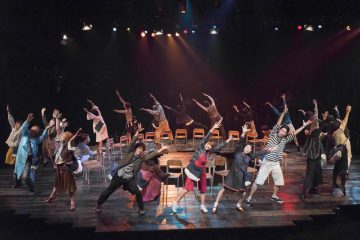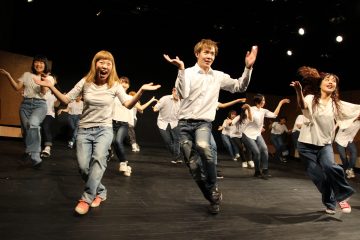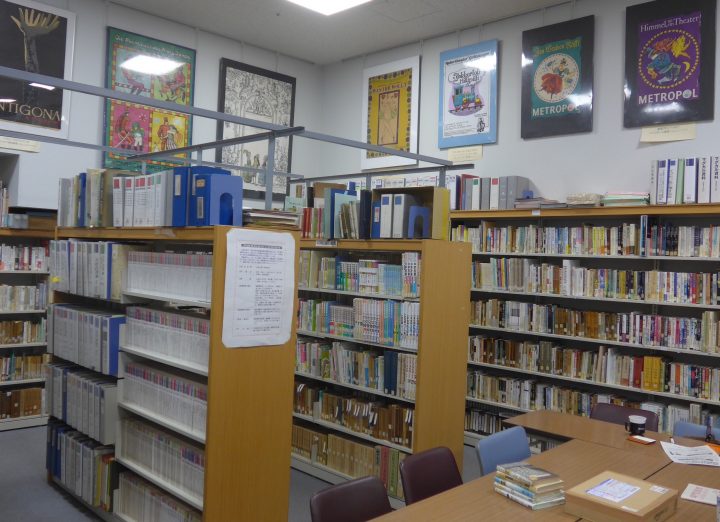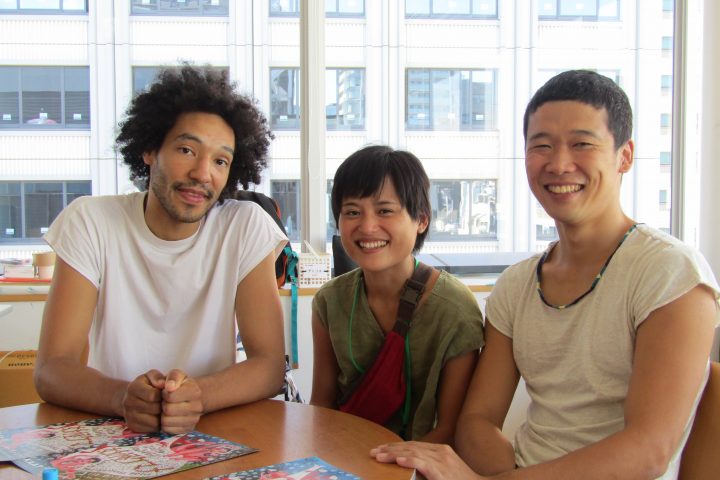KAAT Kanagawa Arts Theatre Akira Shirai appointed artistic supervisor First production "Lost Memory Theatre" Interview with Akira Shirai (composition and direction) and Jun Miyake (original concept and music)
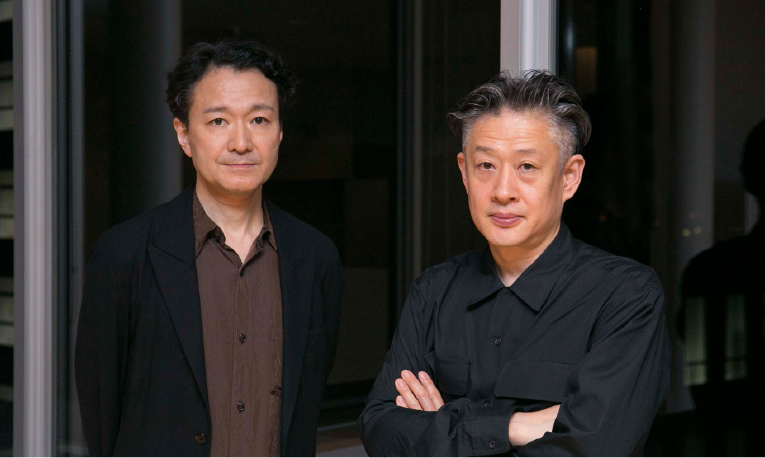
Akira Shirai was appointed artistic supervisor of KAAT Kanagawa Arts Theatre in April this year. His first production, Lost Memory Theatre, is a challenging attempt to stage the album Lost Memory Theatre act-1, released in 2013 by the world-renowned musician Jun Miyake. The motifs are the theater itself and music. How did this sensual crossbreeding of theater, music and dance come about? We spoke to Akira Shirai and Jun Miyake about the trial and error and collaboration that went into creating a completely new stage production, from the beginning of the project.
Interview & Text: Eiji Kobayashi
Photo (Portrait): Masamasa Nishino
Interview cooperation: KAAT Kanagawa Arts Theatre
▼ Akira Shirai (Composition and direction)
Director, Actor/KAAT Artistic Supervisor
After graduating from Waseda University, he was the founder of Yu◉Kikai/Zenjido Theatre from 1983 to 2002. His directing skills were recognized during his time with the theater company, and after going independent as a director, he has worked on a wide range of productions, from operas, musicals, and musical plays to straight plays. In particular, he has directed foreign novels and plays such as Paul Auster's "Moon Palace," "Music of Chance," and "Ghosts," and Philip Ridley's "Pitchfork Disney," "The Fastest Clock in the Universe," and "Mercedes Ice," with his own unique aesthetic, and has been well received. Recent directing works include "Joan of Arc," "Tenshu Monogatari," the musical "GOLD~Camille and Rodin~," "Phantom Butterfly," "4four," "Othello," and the musical play "Woyzeck." Operas include "White Nights of Love," "Othello," and "The Bat." Appearances include "A La Carte" (1989-2008 Aoyama Round Theater) and "Okepi! His works include "The Great Passage" (2000, 2003, written and directed by Mitani Koki), "The Andersen Project" (2006, written and directed by Robert Lepage), "Sakurahime" (2009, written by Nagatsuka Keishi, directed by Kushida Kazumi), "The Tragedy of Faust" (2010, written by Christopher Marlowe, directed by Ninagawa Yukio), "The People's Film" (2011, written and directed by Mitani Koki), "Tennibo" (2012, written by Kudo Kankuro, directed by Kushida Kazumi), "The Room of Hobbies" (2013, written by Furusawa Ryota, directed by Yukisada Isao), and "Macbeth" (2013, directed by Nagatsuka Keishi). He won the 9th and 10th Yomiuri Theater Awards Outstanding Director Awards for his directing activities in 2001 and 2002. In 2005, he won the 2005 Yuasa Yoshiko Award (Screenplay category) for his direction of "Music of Chance." He also won the 10th Sagawa Yoshio Music Award for his work directing Matsumoto Civic Opera's The Magic Flute in 2012. In April 2014, he became the Artistic Supervisor of KAAT Kanagawa Arts Theatre.
▼Jun Miyake (original concept and music)
Composer
Discovered by Terumasa Hino, he studied at Berklee College of Music and began his career as a jazz trumpeter. In addition to his activities as an artist that pointed out the blind spots of the times, he also distinguished himself as a composer and has been involved in many works such as commercials, movies, anime, documentaries, and contemporary dance. Among his more than 3,000 commercial works, many have won awards at the Cannes International Advertising Film Festival and the Digital Media Grand Prix. He has participated in works by Pina Bausch, Wim Wenders, Robert Wilson, Philippe Decouflé, Oliver Stone, Jean-Paul Goude, and Katsuhiro Otomo, and his unique sound, which makes extensive use of cross-breeding, has received international acclaim. Through his activities that transcend genres, he has collaborated with many overseas musicians such as Hal Willner, Arto Lindsay, David Byrne, Grace Jones, Arthur H., and Vinicius Cantuaria. He has also established a base in Paris since the fall of 2005 and is currently active there. His albums "Stolen from Strangers" (2007) and "Lost Memory Theatre act-1" (2013) won the "Best Album of the Year" and "Music Critics' Award" in French and German music magazines. He was selected as Galeries Lafayette Homme's "Man of the Year 2009", and in May of the same year, Jun Miyake's posters filled the streets of Paris. Wim Wenders's "Pina", for which he provided the main songs, won the Best Documentary Award at the European Film Awards 2011. It was also nominated for the Best Documentary at the 2012 Academy Awards and the Best Foreign Language Film at the 2012 BAFTAs. He has participated in many of Akira Shirai's films, including "The Threepenny Opera", "The Chinese Mysterious Official", "Glass Leaves", "Ghosts", "Joan of Arc", "Woyzeck", and "9 Days Queen".
Towards the realization of a stage dreamed of through music
- Mr. Shirai was appointed artistic supervisor of KAAT Kanagawa Arts Theatre (hereinafter referred to as KAAT) in April this year, and his first production, "Lost Memory Theatre," is an innovative project that is a stage adaptation of the album of the same name released last year by musician Jun Miyake.
Shirai : Now that I'm in this position, when I thought about what kind of work I should stage as a kind of statement of belief, I could have chosen something from existing plays, but I thought that would not be interesting. I have always been conscious of the fact that theater is not only a literary element based on a play, but also a comprehensive art of music, visuals, and physical expression. So, at KAAT, I had in mind that I would like to aim for a performing art that incorporates more elements than just what is called a theatrical work. And at that time, the first thing that came to my mind was Miyake's music. I have worked with Miyake many times in the past, and I had actually had a glimpse into the creative process of his album "Lost Memory Theatre act-1" released last year, so I wondered what the scenery this music would create would be like? What would a stage with the music from Miyake's album playing be like? I was imagining it on my own. Normally, a play starts with a script, but I have always had doubts about this, and in the past, I have improvised a play based on the actors first, or I have written a play from a novel. If that's the case, I thought it might be possible to create a stage play based on Miyake's music, and that's how I came up with this project.
--I understand that it took some time from when you launched the project until you actually spoke to Mr. Miyake.
Shirai : I knew that it was a project that would normally be impossible to realize, so I thought it would be rude to tell Mr. Miyake unless there was a guarantee that it would actually be realized. I had met Mr. Miyake for another job, but I kept quiet about the fact that I had been having meetings with KAAT behind the scenes, and only confessed after the theater began to move towards realizing it.
Miyake : I had no idea about the underwater movements to that extent, so when I heard the story from Mr. Shirai, I was happy and at the same time wondering if it was really possible. The thing that came out of my mouth was, "Well, I don't think there's a place that would let me do it." However, when I asked him in more detail, I realized that maybe it wasn't a lie after all.
Shirai : Lol.
Miyake : However, it is a great honor to hear this, but I make music because I cannot put into words the layers of emotions that I cannot express, and I have always left all the space up to the listener to interpret the music. But when the element of theater comes in, there is a risk that the meaning will be limited by words. A sense of crisis about this immediately crossed my mind. In fact, I still haven't gotten rid of that feeling (laughs), and I am currently having various discussions and battles with Mr. Shirai.
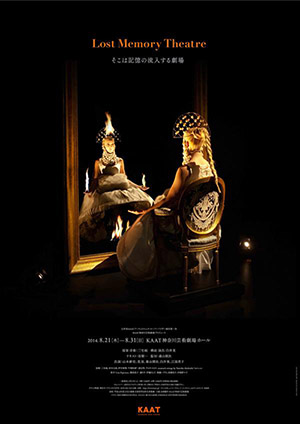
"Lost Memory Theatre" flyer visual
A collage of images that emerge as if embossed between songs
- Was what you imagined from the music a grand story revolving around the theater?
Shirai : No, it's completely different from a story. First of all, it was a fragmentary collage. For example, I had a specific actor in mind who I wanted to be in the scene of this song by Miyake, and I thought that there were four girls from classical ballet in this song, and it was just my own image that came to mind. I thought it would be interesting to group all those various images together under the keyword "theater" from the title "Lost Memory Theatre". So, it really started from a vague image at first.
Miyake : Shirai was particular about the "theatrical structure," and for a while, what we were thinking was very different, but I had originally imagined it to be made by connecting collage-like images. However, when I thought about how it would look from the audience's perspective, I thought it would be better to wait for some kind of synopsis as a common understanding among the performers, even though there was no need for a story to be told there, so I wrote that. Then, it gradually took on a life of its own, and as we exchanged ideas between the two of us, the composition took on too much shape. From there, we are now in the trial and error stage of thinking about how to distance ourselves from it, how to destroy it, what to cut out and what not to say.
Shirai : When I listened to the song, I had a part of me daydreaming about it based on the title "Lost Memory Theatre". However, since Mr. Miyake is in a position like the original author of this play, he had a big concept in mind, as written in the liner notes, "What if there was a theater where lost memories flow in somewhere?", so I thought that I had to cherish that image. However, as I piled up the words, it expanded too much, and there came a moment when I felt that "I'm trying to tell a story!" Mr. Miyake also felt that this was dangerous, and we came to a common crisis awareness that we should cut down the words more, and it's been about the past two or three days. But it may have been good to have done this work once.
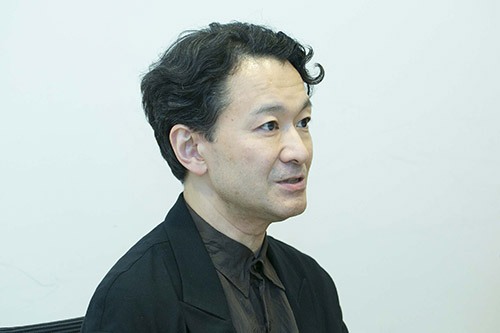
Miyake : I think it was good too.
Shirai : I may have used too many words, but the memory of that remains in both the actors and the director. If you create this scene with that thought in mind, I think that even if no words are actually said, it will flow and be reflected at the bottom.
Miyake : Yes. As long as time permits, the same process of "construction and demolition" may be repeated.
Shirai : Ultimately, the ideal thing would be for it to be like a collage, with images between each song, and for what I wanted to present at the beginning to emerge vaguely, as if it were being exposed.
Life is not lived according to a pre-written script
— Creating that kind of image seems like a difficult task, given the high degree of freedom involved.
Shirai : That's right. Since the options are infinite, we have to limit it somewhere. The first thing I did with Miyake was to choose the songs, and then we decided on the order of the songs. You could say that we restricted ourselves in that way. Since we are trying to create a piece that is inspired by music, the selection of songs is important. However, I thought that the order of the songs would be decided naturally as we were creating it, but Miyake said that we should decide it first, which confused me a bit.
Miyake : On the contrary, I felt like nothing would be decided until the order of the songs was decided.
Shirai : So, almost as if I was being threatened (laughs), I forced myself to come up with the order of the songs, exchanged opinions with Mr. Miyake, and then created the performance based on the flow that we finally agreed on.
Miyake : I wasn't trying to tell a story in particular, but the order of the songs does lead to a certain flow, and if that flow wasn't maintained, in other words, if the songs were chosen to match the play, it would end up being the opposite pattern.
Shirai : That's right. In that case, it would end up being the same as always. In this case, the flow of the music becomes what would be called a play in a normal play. Having realized that, I think it was actually a good thing.
-- Will all the songs used be from the album "Lost Memory Theatre act-1"?
Miyake : The album "Lost Memory Theatre act-2" will be released on August 20th, and will include "Act-1", "Act-2", and two songs from the previous album "Stolen from strangers". For me, "Stolen from strangers" is the prologue to "Lost Memory Theatre", so for me these three works are part of one big flow.
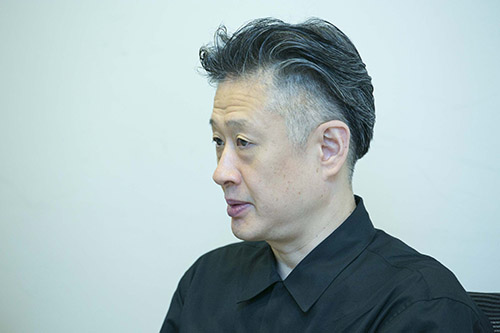
— You choose the musicians who perform, right?
Miyake : Yes. The musicians on this project are top studio musicians whom I have trusted for many years, more than 30 years in fact. Of course it's live performance, but on stage there are recordings running alongside each other, so in terms of music, there may be some parts where you wonder whether it's a dream or reality.
- On the other hand, the text was written by a young writer, Kenichi Tani. What was the intention behind this?
Shirai : As we were creating fragments of images, there was a method of weaving words together between myself and Miyake-san, but I thought it would be nice to have someone who could weave words from a completely different place, and this is the first time I've worked with Tani-san, but I thought it would be nice if he, who is about two generations younger than me, could bring something that doesn't belong in my context and have a good effect on this work. So, in terms of the offer, I asked for a few words without calling it a "script," and credited it as "text," under the condition that "the words I use may be 100, or they may be none. I may also cut or rearrange what you give me."
— It's a musical theatre, but it's also different from opera.
Shirai : It's not an opera. Anyway, I thought it would be interesting if all the elements were included. I create plays from scripts, and I create works by discussing the character development with the actors, but sometimes it gets boring, and I think it would be better if it was more of a collage of images, so this time I went all the way with that. The actors always try to carry the play through with a single personality, but I want them to think of this as a "theater" that I created, and that the actors' scripts are inside them, and they can create the drama as they wish.
— That's how it feels for the viewer as well.
Miyake : But isn't that the case with life itself? We don't all live by a pre-prepared script, and when memories are involved, people who happen to be in the same place may have completely different memories, and even the main character doesn't know what's going to happen. I think it's better to think that such things are somehow happening on stage.
- So, what about stage design? Sets can also be an element that can lead to certain fixed images.
Shirai : That could happen. So I thought I would create another "theater" inside the theater, and I decided to place Miyake's music and the images that go with it. So, a story may unfold in which you don't know why there is a "theater" here, and I think that's fine. Theaters are places where this is allowed, where all kinds of fiction is performed, and after a few days it breaks down, and only the theater retains that memory. I create art spaces with that concept in mind.
Collaboration made possible thanks to the trust we have built up
- This time, you're creating a play starting from the music. How is that different from the music you compose for a dance project, for example?
Miyake : I've worked with dance before, with Pina Bausch and Philippe Decouflé, but in so-called dance-only work, there are times when the choreography is followed by music, or vice versa, but in either case, the physical expression itself is often the main character. In other words, the protagonist is the dancer, so the music removes a backbone-like part and works to open up space for the protagonist. However, this time, the subject is music that is already established as music, so that's not what I'm going to do. It's difficult to coexist with dance in that sense, and I'm currently watching to see what I can do about it.
Shirai : It is often said that for a dancer, music is like a script, and when choreographing, I think you have to create meaning to match it. However, in this case, I don't think it's good to just go along with Miyake's music, but I hope that a different story will emerge from the dancers or actors. It's the same for me as a director, but for example, when I think of a person's movement based on Miyake's music, I think it would be better to stop making movements that explain the music. Rather, what kind of image do you create from your brain through that music? I always think that it's a big challenge in the relationship between the body and music. Even when I watch a regular dance performance, I sometimes wonder which came first: was the choreography done after the music, or was the physical expression done first and then the music?
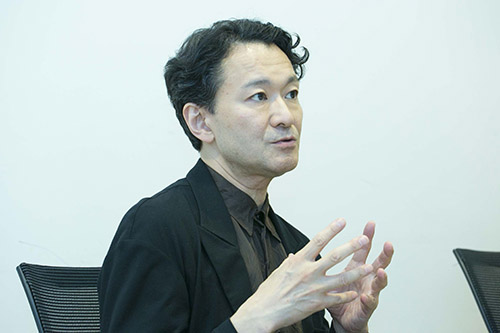
Miyake : By the way, in Pina's case, it's overwhelmingly the latter. The music isn't added until the very end, and the music director makes a presentation as the opening day approaches, so it's mostly song selection. However, in my case, when that continued for a while, I thought I could be more actively involved, so I provided some originals. But usually it's song selection, and it's only decided at the last minute. So when I'm told, "They're using it," I go to the theater to see it, and I'm like, "Oh, they're really using it" (laughs).
— In that sense, Miyake's involvement this time is completely different from Shirai's previous works.
Miyake : No, it's not. I usually just observe from the sidelines, and by the time rehearsals start I usually have an idea of the structure, so I wait to see how it fits together, if there are any points that need to be changed, and basically how Shirai-san feels about it.
Shirai : It's almost the opposite now. I wonder how Miyake feels about what I've created. Then I give him feedback and think about it again, wondering if there are parts where we're starting to feel the same way, or what parts of it he feels are off. In that sense, I feel like we're creating something together, going back and forth.
Miyake : I'm always raising issues and causing you trouble, but I think it's really wonderful that we've been able to build this kind of relationship of trust.
Shirai : I think it's a good relationship to be able to discuss things, but it's also just like a business-like relationship, where they'd say, "We'd like to ask you to do a few songs for us," and we'd say thank you, and then we'd use them or not.
I want it to be a work that recalls a different story or memory than what is happening in front of me.
How would you like the audience to experience this performance?
Shirai : No, I don't have any particular idea how I want people to watch it. Conversely, I'd like to know how people feel when they watch it.
Miyake : I think the same when I create music, but I think that the very expression of emotions can create emotion. In other words, it makes you think, "It's okay to express myself like this in front of people!" I hope that this stage performance will be an extension of that. So I leave it all up to the audience to decide how they feel.
Shirai : This time, while I'm creating, I'm just trusting my own physiology and intuition, and I want to accumulate things that make me think, "This is good, I hope it's like this." So, instead of thinking logically, if I think, "Oh, what I just said doesn't seem right," then it's probably a mistake. I'm trying to sharpen all those "huh?!" thoughts, such as "I'm explaining too much," or the moment when I think, "Something just wasn't right," in choreography, and try to see only what I want to see.
— So it feels like there's some wiggle room left in the process?
Shirai : I don't have any blank spaces in my mind, but I think blank spaces are necessary when the audience sees it. If you cram it in too tightly because you want the audience to see it in a certain way, it will end up being wrong. I want more space to make them wonder, "What was that?"
-- As I listen to your story, I'm starting to think that it would be great to have many different versions of "Lost Memory Theatre."
Miyake : Yes, I have had that image from the beginning. If the venue changes, the cast will change, and the song selection will change too. For example, if we do it in New York, someone will be in it, and I think it would be good to have that kind of format. I think you can make any number of completely different versions.
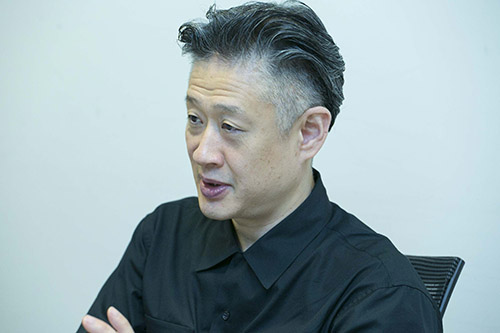
Shirai : Actually, when we first started this project, we had the idea that we should continue to create stage productions in the form of "opus-1" and "opus-2" like Miyake-san's albums "act-1" and "act-2", so we were thinking of adding the title to it. But, well, this project itself was a project that was not even visible to this theater (laughs), so we withdrew it a bit. I myself was not sure what would happen, but if possible, I would like this to be known as "opus-1" in the future.
- I think the stage has the effect of making you forget your daily life by immersing yourself in the space that unfolds there, but on the other hand, as Mr. Miyake said earlier, I think it can also be said to be a place where life is condensed. I'm really looking forward to seeing what kind of images will emerge from "Lost Memory Theatre".
Shirai : I think it's wonderful to see a work as a well-crafted story, but I like it when I come across a work that reminds me of a different story or memory of my own while watching it. I hope that "Lost Memory Theatre" will give the audience that feeling. I think it's good when the music evokes memories, and each person imagines or remembers something different from what they see in front of them, or hears different sounds or words.
Miyake : In order to achieve this, timing is becoming increasingly important.
/////////////////////////////////////////////////// /////////////////////////////////////////////////// //////////////////////////////
<Magcal Postscript>
— Please tell us about any foods or places in Kanagawa that you have a special attachment to.
Shirai : For me, it's Kanagawa Prefectural Hall. I've come here many times to see Pina Bausch's "Carnation," and when Decouflé performed "IRIS," so I've mostly come to Yokohama just to come to the Prefectural Hall. As for my own work, the Prefectural Hall was the first place I was allowed to direct an opera, and it was deeply moving to have the opportunity to perform "White Nights of Love" (2006), an original opera by Takashi Tsujii and Satoshi Ichiyanagi, who passed away last year. In that sense, when you think of Kanagawa, it all comes down to Kanagawa Prefectural Hall.
Miyake : I grew up in Kamakura and went to high school in Yokohama, but I only went to school in the morning and spent most of my time hanging out at a jazz cafe called Down Beat in Kannai. I went there almost every day, so the cafe staff would tell me, "You've been taken to the police station for guidance" (laughs). From my house in Kamakura, I could see Enoshima in the distance, and the image of the waves crashing against the breakwater and lighthouse there during typhoons still haunts me in my dreams.
